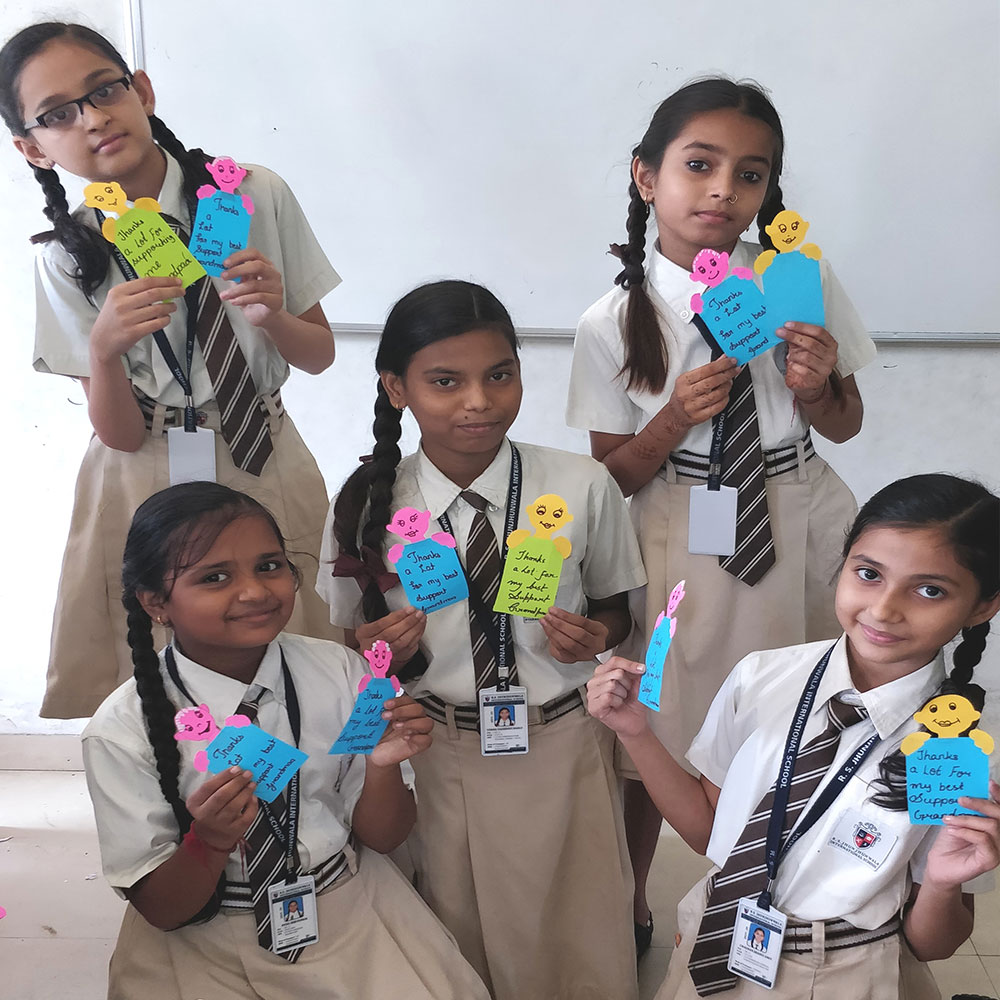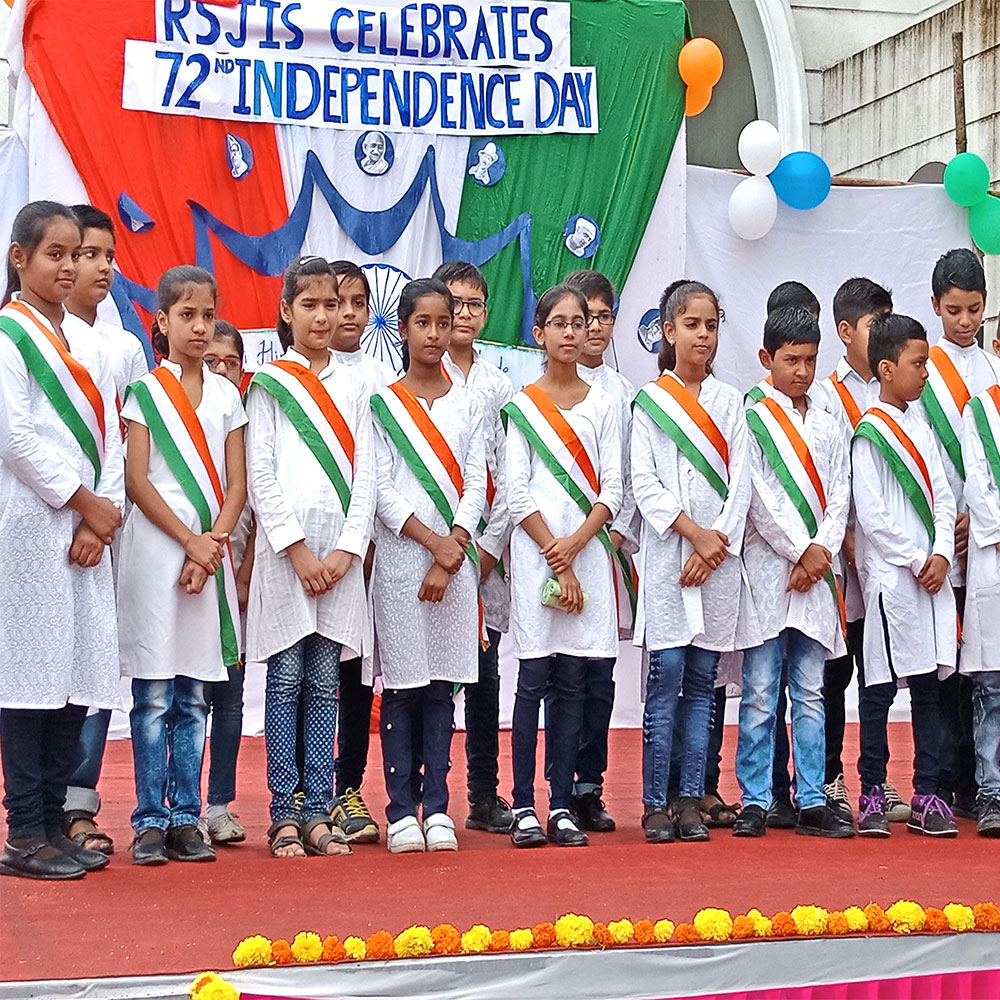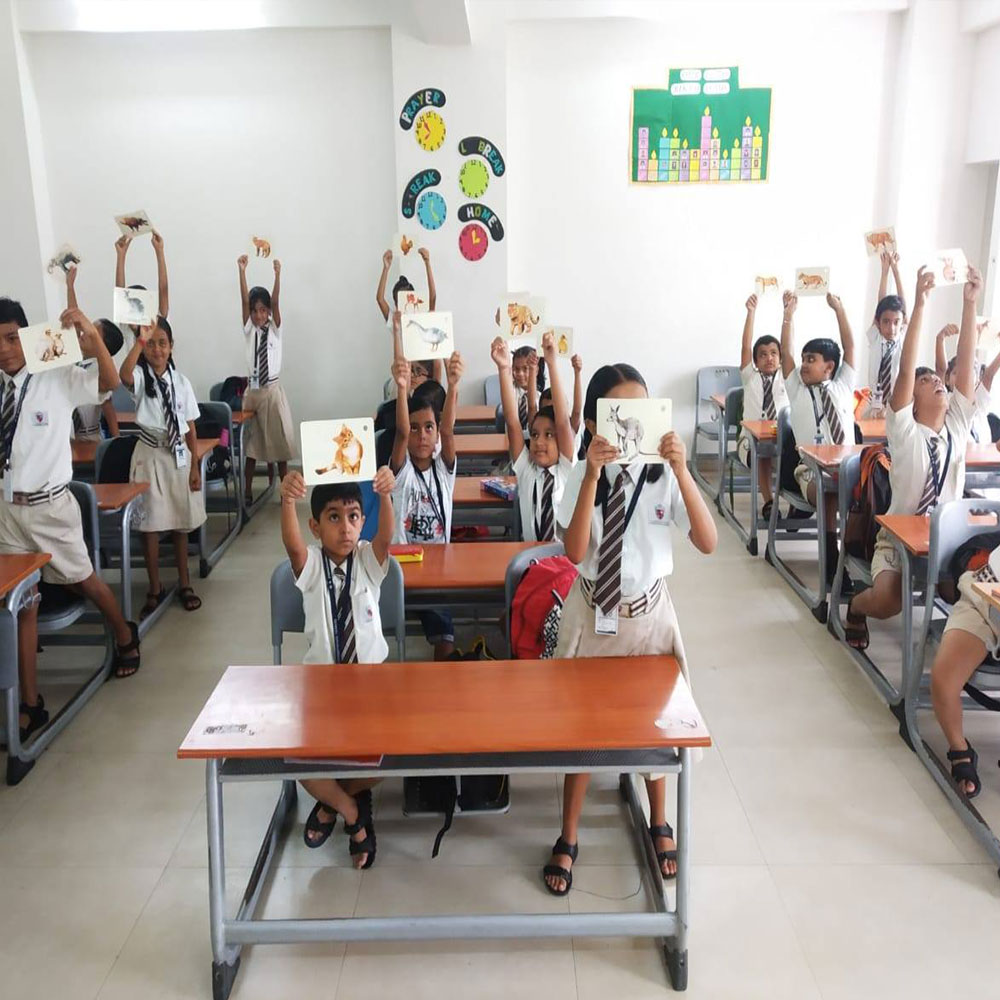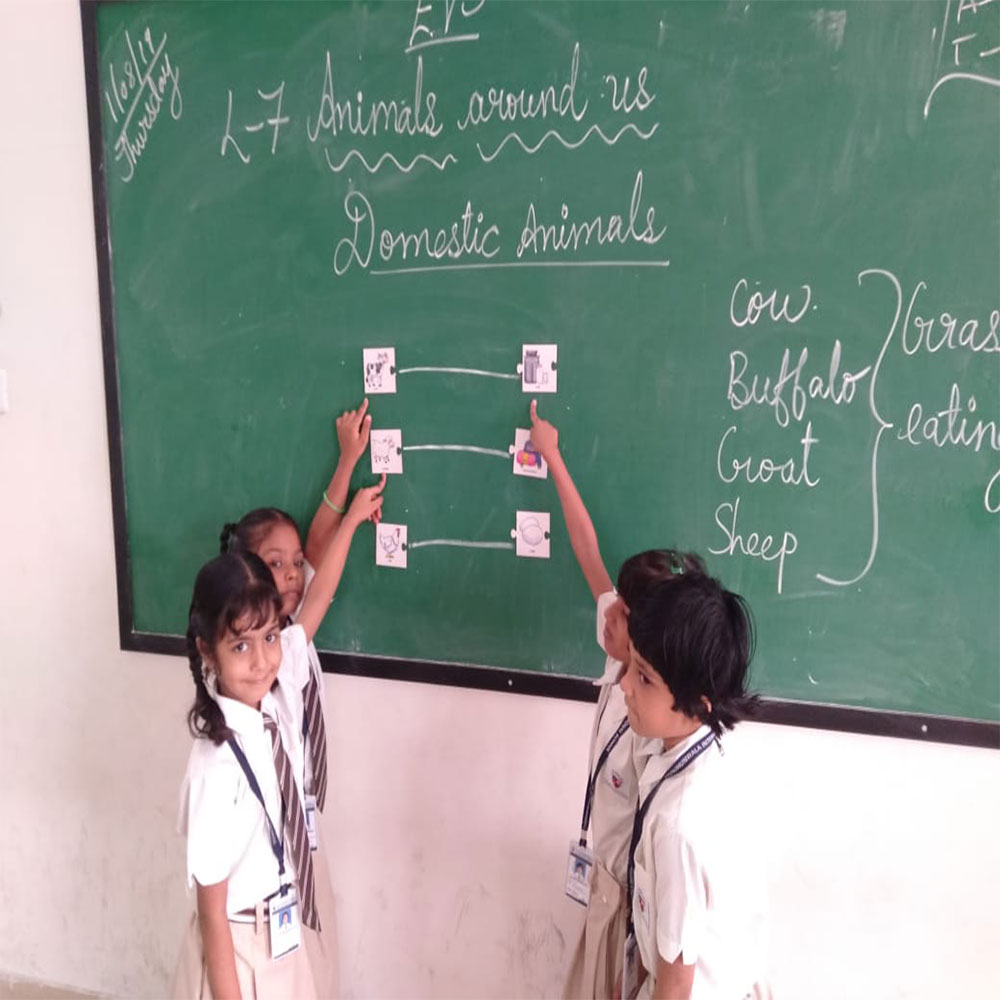Primary & Middle Primary Section
The switch from Kindergarten to Primary section is very crucial for the children as well as the parents. Various developmental needs of the child with respect to Language, Physical education, general knowledge, arts, and music, etc. are taken care of.
The Upper Primary section comprises Grade VI to VIII. RSJIS follows the CBSE curriculum and focuses on quality education and empower children with leadership qualities. The holistic development of children is our main motto.

RSJIS Develops:
Reading, Speaking and Listening Skills
Mathematical and Scientific Skills
Music, Dance, Art and Craft and General Awareness.
Nurture Sports talent
Enhance Interactive and Writing skills.
Various Features Covered:
Well-Qualified Teachers
Various activities to enhance interactive and writing skills
Ideal Student Teacher Ratio
Hi-Tech Smart Classes
Skating Rink
Karate and defense training
Remedial Learning
Subjects & Learning Strands
CLASS –I
Click For Subject Details
| 1. English |
| 2. Mathematics |
| 3. EVS |
| 4. Hindi |
| 5. Computer |
CLASS –II
Click For Subject Details
| 1. English |
| 2. Mathematics |
| 3. EVS |
| 4. Hindi |
| 5. Computer |
CLASS –III
Click For Subject Details
| 1. English |
| 2. Mathematics |
| 3. EVS |
| 4. Hindi |
| 5. Computer |
CLASS – IV
Click For Subject Details
1. English |
2. Mathematics |
3. Science |
4. Hindi |
5. Social Science |
6. Computer |
CLASS –V
Click For Subject Details
1. English |
2. Mathematics |
3. Science |
4. Hindi ( Language-II) |
5. Social Science |
6. Computer |
7. Gujarati (Language-III) |
CLASS –VI
Click For Subject Details
1. English |
2. Mathematics |
3. Science |
4. Hindi ( Language-II) |
5. Social Science |
6. Computer |
7. Gujarati (Language-III) |
CLASS –VII
Click For Subject Details
1. English |
2. Mathematics |
3. Science |
4. Hindi ( Language-II) |
5. Social Science |
6. Computer |
7. Gujarati (Language-III) |
CLASS – VIII
Click For Subject Details
1. English |
2. Mathematics |
3. Science |
4. Hindi ( Language-II) |
5. Social Science |
6. Computer |
7. Gujarati (Language-III) |
School follows CCE evaluation system to cover all aspects of students’ development. Along with the above subjects, the children get exposure to physical education, art, craft, dance, and music under creative and performing art.
Examination & Evaluation
Grade I-V
I: Scholastic Evaluation
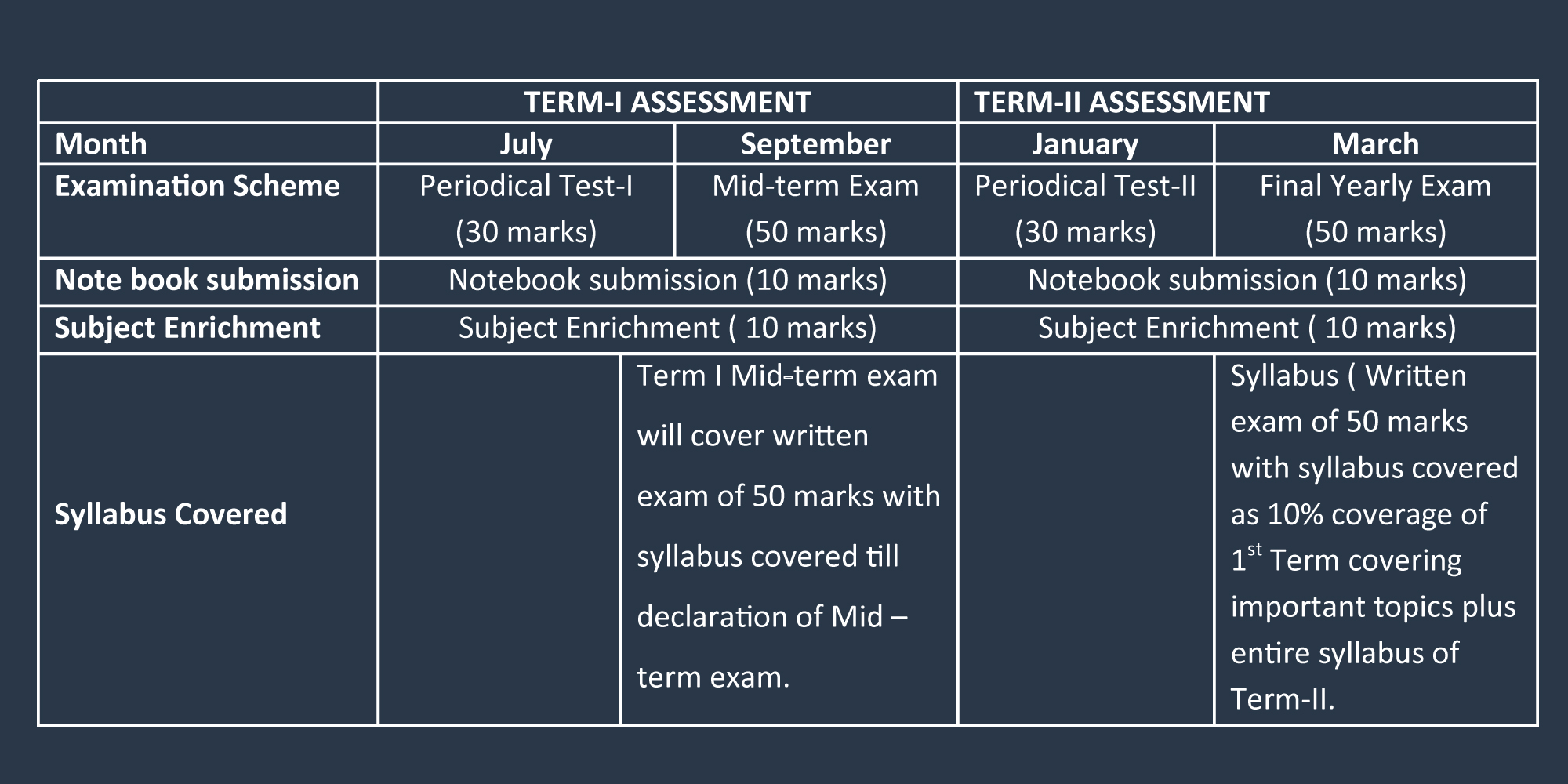
Grade VI-VIII
I: Scholastic Evaluation

Syllabus Covered & Grading System
- The mid-term exam will cover a written exam of 80 marks with syllabus covered till the declaration of date of mid –term exam.
- Syllabus Grade VI: (Written exam of 80 marks in Term II with the syllabus covered 10% of 1st term covering significant topics plus entire syllabus of Term-II.)
- Syllabus Grade VI: (Written exam of 80 marks in Term II with syllabus covered 10% of 1st term covering significant topics plus entire syllabus of Term-II.)
- Syllabus Grade VII: (Written exam of 80 marks in Term II with syllabus covered 20% of 1st term covering significant topics plus entire syllabus of Term-II.)
- Syllabus Grade VIII: (Written exam of 80 marks in Term II with syllabus covered 30% of 1st term covering significant topics plus entire syllabus of Term-II.)
Notebook submission: (Grade I-VIII)
Notebook submission is a significant part of internal assessment. It is crucial as its motive is to impart a habit among students towards preparing notes of the topic taught in class.
Before each periodic and term Examination, notebook maintenance can be evaluated based on the following parameters –
- Regularity
• Assignment completion
• Neatness and upkeep of notebooks
Subject Enrichment Activities: (Grade I-VIII)
Subject-based activities aim at overall concept clarity and skill development. These are subject-specific application activities aimed at enrichment of understanding and skill development.
For Language Subjects: Activities based on developing effective Listening, reading, speaking, writing skills.
For Mathematics: Mathematic lab activities and understanding concept by practical work.
For Science: Practical Works/activities may be carried out as prescribed by the CBSE/NCERT
For Social Science: Map and Project work as per CBSE Curriculum.
Co-scholastic Evaluation (Grade I-VIII)
Along with the evaluation of the scholastic area, there is also a weightage for Comprehensive evaluation for holistic development.
Co-curricular activities are promoted for the holistic development of the student. These activities will be graded term wise on 3 points (A-C) grading scale. The aspect of regularity, sincere participation, output, and teamwork be the generic criteria for grading in the following co-scholastic activities.
- Work education: It refers to skill-based activities resulting in good or services useful to the community.
- Art education ( Visual & Performing Art)
- Health & Physical Education (Sports/ Martial Arts/Yoga etc.)
Discipline (Attendance, Sincerity, Behavior, Values): ( Grade I-VIII)
Discipline is embedded values of Punctuality, regular attendance, sincerity, good behaviour, and values. It is graded term wise on 3 points (A-C) grading scale.
Grading System (Grade I-VIII)
Grading Scale for Scholastic Areas:-
(School will award grades on 8 point grading scale as per CBSE Guidelines)
| MARKS RANGE | GRADE |
| 91-100 | A1 |
| 81-90 | A2 |
| 71-80 | B1 |
| 61-70 | B2 |
| 51-60 | C1 |
| 41-50 | C2 |
| 33-40 | D |
| 32 & Below | E ( Needs Improvement) |
Promotion Policy
- Regularity and a minimum of 80% attendance are compulsory.
- School management may detain the student if a student fails in more than two subjects and not able to cope up with the educational standard of school after the mutual consent of the parent.
- If a child detained in two or less than two subjects in the annual examination then he will be given a remedial exam opportunity to prove his performance and eligible for the next class ( Till 7th Standard)
- A student has to secure a minimum of 33% in scholastic assessment in annual examination to qualify for promotion to the next class.
- School can provide a maximum of 10 marks as grace to extend the percentage of a student to 33% in annual examination.

